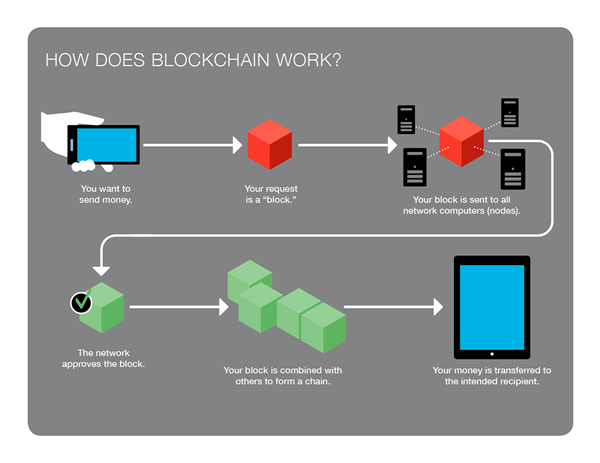by
User Not Found
| May 15, 2018
If you Google “blockchain” today, you’ll receive more than 25 million results: It’s certainly a hot topic. But most people are unclear on what blockchain is, why it’s important and how it could change financial services in the future. Let us explain, while sharing the top three benefits of blockchain technology.
The basics
What is blockchain?
Blockchain is essentially the internet of value. No one owns it, everyone can access it, and the information on it is secured and distributed without an intermediary. Blockchain allows data and transactions to be broadcast, completed and recorded on a peer network. The blocks are bundles of data, transactions or records (like pages in a book) and the chain is the string of blocks linked together (the book itself).
How blockchain works
Below is an illustration of how blockchain works. Here, we show the process of sending someone money as an example, but the same technology can be applied to other types of transactions as well.

The benefits of blockchain
Blockchain’s disruptive technology has the capability to dramatically change industry dynamics in profound and widespread ways. Here are three major benefits of blockchain:
1. It helps to eliminate the duplication of assets.
The decentralized, indelible recordkeeping qualities of the blockchain are key components of the framework that prevents the duplication of assets. An example of this would be if you wanted to send your friend $20, the integrity of the network requires that your account is debited and your friend’s account is credited the same amount. Historically, this has been a challenge when considering a digital transfer of funds as the “cash” was nothing more than an electronic file that could be duplicated or falsified. Blockchain helps solve this problem. Just as important, the process used for cash transfers can also be applied to other assets such as stocks, bonds, intellectual property or music rights.
2. It’s a safer and more secure way to transact.
Because the records of all transactions are publicly verified, completed and stored, they cannot be manipulated or hacked without every participant knowing and the entire chain being affected. This open-architecture structure should prevent incidents such as data breaches, for example. Without a central authority to approve transactions, there’s no need to trust an intermediary and thus, no risk of your trust being broken and private information falling into the wrong hands.
3. It increases transaction speeds and lowers costs.
Without the requirement for an intermediary, transactions are approved instantaneously by the network and costs are lower as a result of cutting out the intermediary institutions. For example, when you use your credit card to make a purchase at a store, that transaction is recorded by you, your bank, the credit card company, the store and the store’s bank. Using blockchain will result in only one record, where the credit and debit are instantly reflected as a block in the ledger (or chain).
The investment opportunities blockchain presents
Not only will individual companies inevitably spend billions of dollars moving their transactional infrastructure to the blockchain, but entire industries will be disrupted. Here are some of the areas we’re watching closely.
Supply chain/logistics: Retailers who adopt blockchain technology will be able to trace every step of the production of the final good. This includes the movement of food from farm to table, tracking components of a finished good during the assembly and production process, or tracking the distribution of the finished good to consumers. As an example, the E. coli outbreak that plagued Chipotle Mexican Grill restaurants in 2015 may have been resolved much faster if the company employed blockchain technology for tracking its ingredients and containing the spread of contaminated food.
Shipping and transportation: The global movement of goods can be managed much more efficiently with blockchain technology and a single source of data and recordkeeping. Tracking globally traded goods by using blockchain technology will reduce waste, errors and lag times, potentially resulting in a boost to global trade activity and GDP. Early adopters of this technology in the industries of shipping and transportation, for example, will benefit.
Cybersecurity: The indelible, decentralized nature of blockchain records is extremely appealing to companies who wish to securely store their data. Without an intermediary in which to trust with the safekeeping of records, companies are less likely to be hacked. As an example, the recent Equifax data breach would have been extremely unlikely had the company used blockchain technology.
Financial services: Financial transactions will be recorded once, instantly. This has massive appeal for companies ranging from financial exchanges (the Australian stock exchange is evaluating using blockchain technology for post-trade settlement) to banks. Reducing human error and duplicative efforts will provide significant cost savings for these companies.
These are just a few examples of the changes we believe will result from widespread adoption of blockchain technology. At Badgley Phelps, we are paying close attention to the companies that are early adopters of this technology and how each individual business model will be affected. While some companies may find their business models threatened by blockchain, others will benefit from massive cost savings. Either way, we are vigilant in identifying the investment opportunities and risks arising from blockchain.
